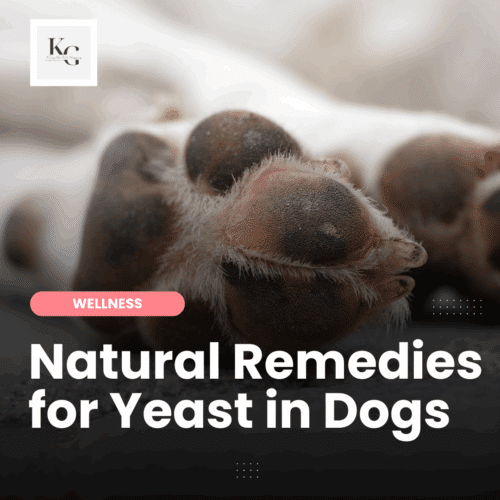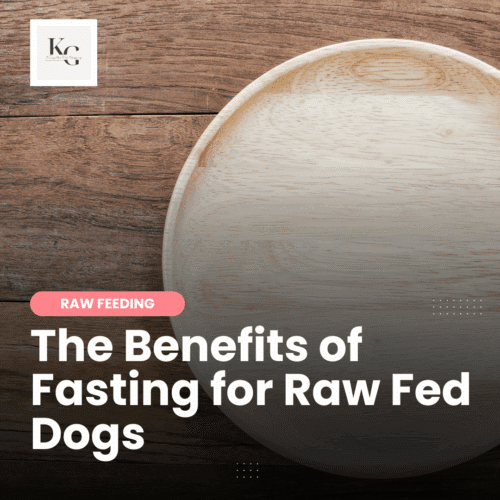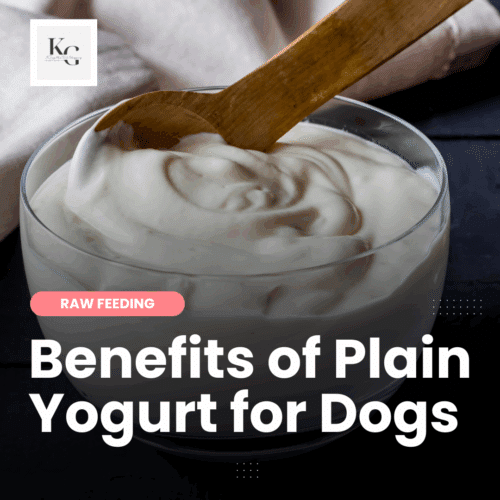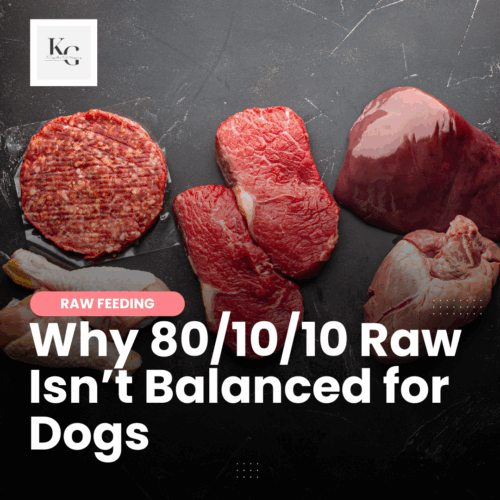Keep the Tail Wagging is supported by pet parents. I occasionally earn a commission (at no additional cost to you) when you click through an affiliate link to one of my favorite products. Thank you for your support. Read More
One of our dogs is going through chemotherapy for lymphoma and, sadly, one of the side effects of the chemo is a lower white blood cell count as the immune system is being challenged by the drugs. Thankfully, for Scout, the drop is slight and our oncologist isn't worried, so I'm not worried. However, I started thinking that it can't hurt to continue adding foods that boost my dog's immune system.
Already, I'm adding supplements that support gut health, the immune system, liver, and kidney health. He's also on supplements that encourage apoptosis in cancer cells while protecting the healthy cells.
Check out my blog post on lymphoma to learn more about his diet.
Whole Foods that Support a Dog's Immune System
You might be surprised that I didn't add raw dog food to my list, but I think if you're here, you might guess that I'm a raw feeder and I do this because I think it's healthier for our dogs, in other words, the diet boosts their immune system.
All of my dogs eat a raw food diet and while Scout is going through chemo, he's eating a diet primarily from Answers Pet Food because their process of fermenting their foods and treats has effectively addressed the bacteria issue that concerns so many veterinarians. He's covered in immune-boosting supplements; I don't want to add more to the bowl. So, the only thing left to boost his immune system is whole food.
When I was probing the internet for this list, I was looking for foods that are purported to support the immune system or gut health. Since about 70% of the immune system lives in the gut, I figure this was a good start.
Fermented Foods
I ferment vegetables and seeds for my dogs to add a natural probiotic to their diet and boost their gut health (and immune system). And when I don't have vegetables or seeds on hand, I add fermented fish stock, kefir, and raw goat's milk to my dogs' bowls.
Answers Pet Food has an entire menu of fermented foods, supplemental foods, and treats that we can add to our dogs' diet. After losing Sydney to cancer last year, I switched Rodrigo, our oldest dog, to Answers Pet Food to better support his gut health, immune system, joint health, and cognitive health and he's thriving beautifully.
Sardines/Mackerel/Salmon
My dogs eat fish several times a week. I prefer fish to fish oil because I try to feed whole foods instead of supplements whenever possible. I source fish through our local raw food co-op and primarily feed sardines (canned or whole) and mackerel (whole or ground).
When it comes to salmon, I'm a little more cautious because Pacific salmon has been linked to salmon poisoning in dogs, which is potentially fatal. So if I have Pacific salmon, I always bake and debone before feeding it to my dogs. Otherwise, I prefer to feed salmon from a reputable raw food brand. Currently, I buy the whitefish and salmon recipe offered by Northwest Naturals (also available through our co-op).
With all that being said, these fishes add Omega 3 fatty acids, which support skin and coat health, joint health, cognitive health, and the immune system.
Whole Sardines and Mackerel
To make mealtime less messy while efficiently utilizing the space in our freezer, I grind the sardines and mackerel and add a hefty spoonful to each dog's dish three to four days a week, both meals of the day. It seems like a lot, but it's not every week and we have big dogs (60-70 lbs).
Canned Sardines
I buy sardines in olive oil (Costco) and the ones in water/no salt added (Walmart). I usually slip a can of sardines between two dogs twice weekly. When it comes to the olive oil, while it's not bad for dogs, if one of my dogs is on a diet, it's tempting to avoid those extra calories – but it's not really that big of a deal, to be honest. I would only be hesitant if I had a dog that was prone to pancreatitis and I'd check with our vet in that situation. Otherwise, my dogs haven't had an issue with the sardines in olive oil. Not even lose stool.
Fresh Rosemary
Okay, I don't know if it has to be “fresh,” but over the past eight years of feeding raw, I've found that fresh is better than processed. So I have a rosemary growing in my flower garden that I can add to my dogs' diet.
Rosemary is a great source of iron, calcium, and vitamin B6, however, I don't know if it's enough to really move the dial on our dogs' daily nutrient intake. But the reason why rosemary made my list is because it's also said to be a great antioxidant. Unfortunately, since Scout is on chemo, I do not add antioxidants to his diet because there are studies that show that antioxidants not only protect healthy cells but may protect cancer cells too. This is a better safe than sorry situation.
My other dogs, however, can enjoy a little rosemary sprinkled on their food from time to time. For our dogs, anything from a pinch of fresh rosemary to a teaspoon would be fine. But before you run off and buy rosemary plants of your own, please do your research too, because I've been told that rosemary oil can be dangerous for pets – so I stick with fresh or home-dried (don't buy a seasoning at the store) for my dogs.
By the way, rosemary plants are also natural bug repellents.
You may have read that rosemary will cause your dog to have seizures, but this warning is referring to rosemary essential oil. And, to be safe, I avoid rosemary extract when cooking for my dogs. Sadly, with the growth in popularity of essential oils, we're seeing low-quality products hitting the market. This is why I only shop with three brands that I trust: animalEO (essential oils formulated by a holistic veterinarian), Plant Therapy, and Simply Earth. The rosemary plant is safe for dogs.
Coconut Oil / MCT Oil
This really should have been the first food that I added because I'm a coconut oil FAN GIRL. This stuff is THE BOMB and, yeah, I'm so dating myself in my excitement. I only give my dogs coconut and MCT oil from CocoTherapy because it's the highest quality product on the market.
Coconut oil is a natural antiviral, antibacterial, and antifungal. It's great for skin and coat health, gut health (where the immune system lives), cognitive health, repelling fleas, and more. I wrote a post sharing how I use coconut oil internally and externally with my dogs and myself.
With MCT oil, I add 1/2 teaspoon per 10 pounds of body weight. So, for Scout, I would slowly work up to giving him 3.5 teaspoons (or one tablespoon) of MCT oil.
Mushrooms and Mushroom Broth
Another great antioxidant comes from yummy mushrooms (I love mushrooms so much and sometimes sauté them in garlic-infused olive oil – yummmm). There is a long list of healthy mushrooms that we can feed to our dogs, and I primarily stick with turkey tail and Chaga supplements from reputable brands. You can also try making a mushroom broth for your dogs (I need to do this). Something easy to do that you can pour over your dog's meal or serve as a separate snack.
Bone Broth
And, speaking of broth, you can easily make your own bone broth and add it to your dog's diet. Bone broth adds a natural source of collagen and glucosamine to the bowl, supporting your dog's joint health. It also supports the gut and immune system too, while adding beneficial minerals and other nutrients to the diet.
I use lamb necks, lamb shanks (for a more meaty bone broth), turkey legs (or wings or carcass), and beef bones to make bone broth. I've been hearing great things about using pigs feet or pork chops to make bone broth and plan to try it this year.
Typically, I make a large batch of bone broth every few months using a pressure cooker. I prefer my Instant Pot to a slow cooker because I can make a batch of bone broth in four to six hours instead of 24 hours. So, I can make up to 4x as much bone broth with a pressure cooker. I always leave the meat in my bone broth (if there is any) and skim the fat off once it's cooled.
I feed bone broth mainly in the cooler months. I like to warm it up and pour a few tablespoons over my dogs' meals.
Chia Seeds / Sprouted Chia Seeds
Another food that I add to my dogs' bowls regularly is chia seeds. I either soak them overnight until they are a jelly consistency OR I take it further and spread the chia jelly in soil (or on a chia pet) to grow chia greens that I clip and sprinkle over my dogs' meals.
Not only do chia seeds pack a nutritional punch, but they are also an excellent source of Omega 3 fatty acids, fiber, and antioxidants.
For my dogs, I mix chia seeds in my DIY veggie mix. But if I add the soaked chia seeds directly to my dogs' meals, I follow these feeding recommendations:
- 1 teaspoon for small dogs
- 2 teaspoons for large
- 1/4 teaspoon for every 10 pounds of your dog's body weight
This year, I'm going to try adding sprouted chia seeds to my dogs' diet. I've read many times that sprouted seeds are crazy healthy because they pack a nutritional punch that is greater than seeds alone. So I want to give this a shot.
Can Foods Boost White Blood Cell Count?
So, as I shared above, the reason I started looking for foods to boost the immune system is that Scout has cancer. After one of his treatments, his white blood cell count was slightly lower, which the oncologist expected. It wasn't a level that caused concern or would put a halt to the treatments and since the veterinarian isn't concerned, I'm not concerned.
I'm still curious though and through my research, I quickly learned that food cannot increase a dog's white blood cell count. What it can do is support the immune system while the body builds its storage of white blood cells.
And, just in case you don't know, the white blood cells are a part of the immune system and fight infections and disease.
Raising Healthier Dogs Naturally
This isn't a complete list so if there are foods I listed that your dog can't eat, no worries, a quick Internet search will introduce you to the many foods that will boost a dog's immune system.
Over the years, I've learned that it's not just about adding these foods to your dog's diet. We have to take the time to research each food to make sure it's a good fit for our dogs. Scout's oncologist advised me to stop adding antioxidants to Scout's diet to avoid making his chemotherapy treatments less effective. I did my homework and decided to follow this recommendation.
Raw feeding is a marathon, not a sprint. We're always learning new things.







